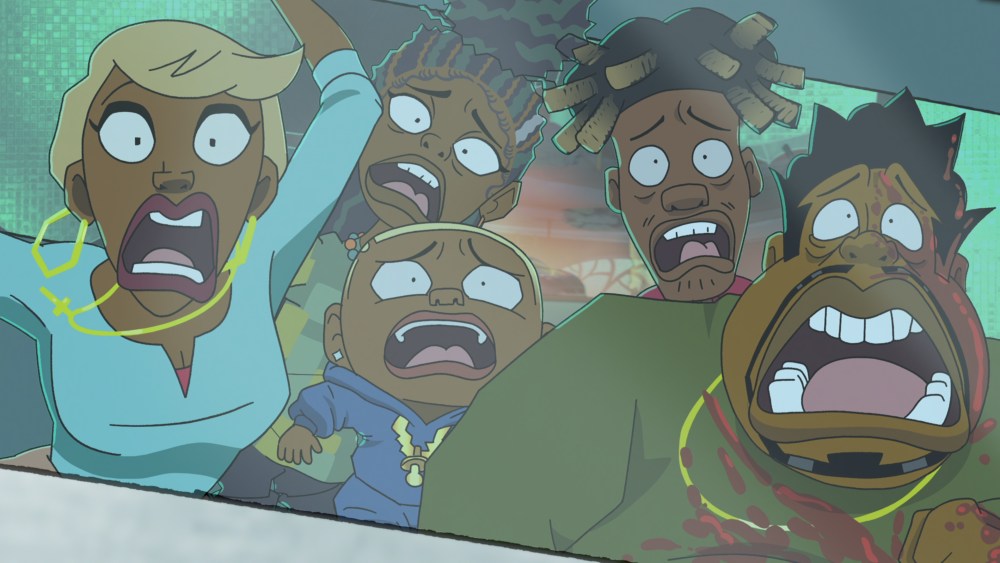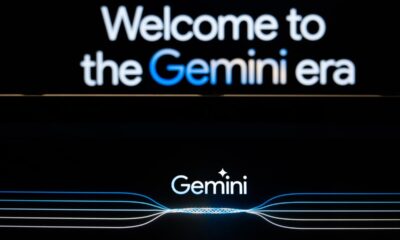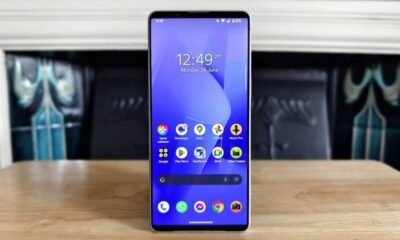Entertainment
Animated Reboot Review of ‘Good Times’: A Mind-Numbing Experience

Fifty years ago, “Good Times” became the first sitcom to portray a two-parent Black American family. Now, Netflix is debuting a modern-day animated reboot that chronicles the Evanses two generations after the original. Set in Chicago’s Cabrini Green projects in the same apartment from the 1970s drama, the series follows Reggie (JB Smoove), his wife Beverly (Yvette Nicole Brown) and their children, Junior (Jay Pharoah), Gray (Marsai Martin) and Dalvin (Slink Johnson). Black people are not a monolith, and respectability politics is certainly not the answer to racism, sexism, bigotry, and homophobia. Still, it’s baffling that creator Ranada Shepard pays tribute to such a classic show in this mind-numbing series while attempting to speak to 21st century black people. It’s also very clear why Netflix decided not to send screeners for review.
In the season opener, ‘Meet the Evans of New’, we learn about the new residents of apartment 17C. Reggie, the grandson of Florida (Esther Rolle) and James (John Amos), is a struggling cab driver with high blood pressure and a penchant for long, drawn-out rants. Beverly is obsessed with appearance, despite her family’s financial problems. Junior, the eldest, is an artist repeating grade 10 for the third time. Gray is super smart and activist, even to her detriment. Finally, Dalvin is a drug-dealing kid who threw Reggie out of the house. The character was likely created to mirror Stewie from “Family Guy” (Seth MacFarlane is executive producer of “Good Times”). Yet it is neither amusing nor tense to portray him as a child drug dealer selling crack on the street corners.
The first three episodes of “Good Times,” the moment I stopped watching, are chock full of repetitive stereotypes, lame jokes and bizarre choices. The Evans’ apartment is cockroach infested and dilapidated. Meanwhile, most of the characters — including Bev’s best friend Lisa (Rashida “Sheedz” Olayiwola), who owns a combination beauty salon and funeral home — appear to be caricatures of black people featured in memes. Cabrini-Green, the infamous high-rise project in which this story takes place, is also a wild choice – since it was demolished in 2011. If you want to shine a spotlight on Chicago, it must be done with fairness and respect for those who call it home. The “Good Times” perspective on the Windy City is not only limited and riddled, but seems to emerge from a skewed gangsta rap version of the city.
Still, there are a handful of interesting components here. When Bev prays, a Black Jesus appears playing a video game, responding to or ignoring her pleas. This visualization is a direct call back to Florida from the original series in which God is invoked. In Episode 2, “Black of Focus,” viewers are presented with an “Inside Out” visual inside Junior’s mind, which directly exposes his academic failures and artistic talent. However, Episode 3, “Grey’s Anatomy,” offers the most compelling storyline. It describes Gray going through her first period while everyone, including the school nurse and Bev, try to shame her about menstruation. In a “The Wiz”-like sequence, this chapter explores the rapid and feminine hypersexualization of black girls, while direct shots are taken at the end of Roe v. Wade by a Trump-like character, Grady Oscar Piles, aka as “GOP”
Despite these few highlights, “Good Times” is riddled with problems. Some of these have already reached the public. The original creator, Carl Jones, wrote on Twitter/X that he left the project during development due to creative differences. Additionally, Yvette Nicole Brown, who portrays Beverly in the series, is under attack on the social media platform because you’re just part of the show. The late Norman Lear, BernNadette Stanis and Jimmie Walker, who played Thelma and JJ respectively in the original series, play small roles. Stanis has spoken publicly about watching the trailer for the new show. “I did a little bit of a vote for them, but I didn’t know it was going to turn out the way it has. I thought it would be different,” she told The Hollywood Reporter. She continued, “It’s just a little bit here and there. But I think they did that because they knew what their show would be like. So I guess they thought, if you put us in there, it wouldn’t look so bad or something.
Black creators and talents have extensive experiences from different political, social and economic backgrounds. Like our white counterparts, we can express our experiences as we see fit. But amid the recent closure of numerous Black-led shows, including “Rap Sh!t,” “South Side,” and “The Wonder Years,” to name a few, it is pathetic that Hollywood champions representations that reduce Black people, racism, and systemic issues to one-dimensional minstrelsy that lacks contemporary relevance. What’s even worse is that the lyrics in “Good Times” just aren’t funny.
The remaining seven of the 10-episode season likely won’t be transformative or strike a different tone than the first three. Firstly, the series fails to bring humor and humor to the daily hardships – which was done masterfully in shows like ‘The Boondocks’, ‘The PJs’ or even the 1970s ‘Good Times’. Plus, the reboot feels dated, as if someone wrote the scripts decades ago and dug them up in the present, with no tweaks or updates added. The themes covered, including money problems and Junior’s undiagnosed ADHD, have been highlighted in plentiful Black-led shows over time. Sitcoms like “Everybody Hates Chris,” “Black-ish,” and “The Cosby Show” discussed these topics with a brilliance that isn’t on display here.
Reimagining “Good Times” for a 21st century audience could have been done brilliantly. Animation offers a wealth of creative freedom, allowing viewers to see characters and their experiences in ways that aren’t possible in live-action. While the series’ predecessor captivated viewers some fifty years ago, these modern Evans are stuck in the past, unable or unwilling to connect with new generations who are still navigating so much and having so much to say.
All ten episodes of ‘Good Times’ are streaming on Netflix.













